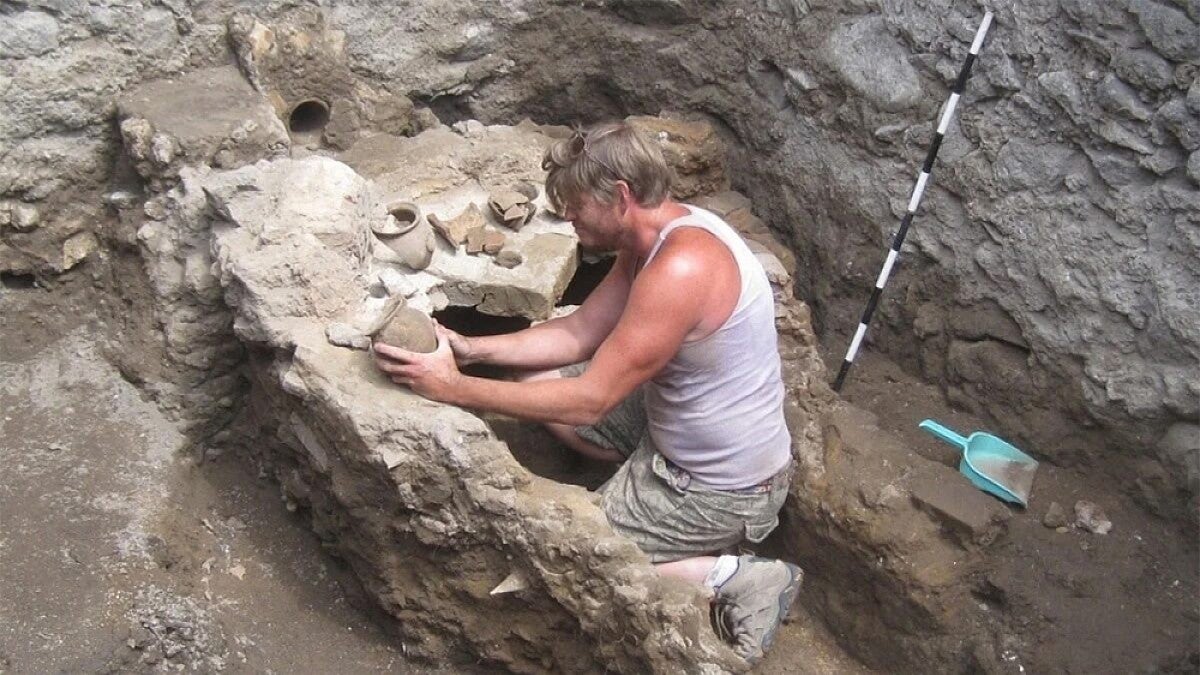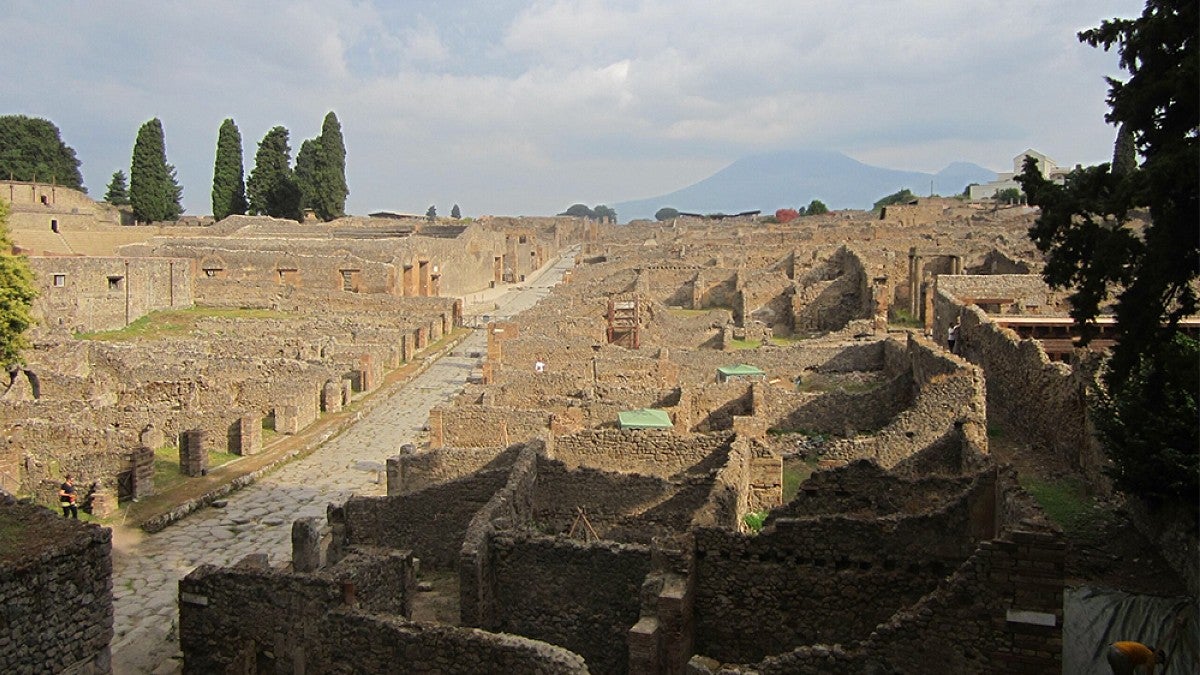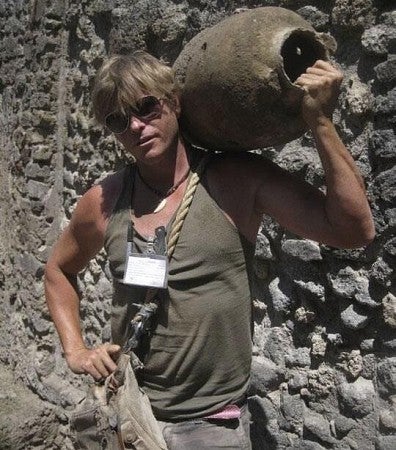
Experiential Learning | Research & Innovation | Community Impact | Career Preparation | Teaching Excellence | 21st Century Liberal Arts | Building Community | Good Vibes | CAS Spotlights | All Stories | Past Issues

Dumpster Diving in Ancient Rome
FEBRUARY 3, 2024
Kevin Dicus wants to know what the Romans who lived in Pompeii did with their trash.
After more than two decades of digging in the volcanic ash covering the ancient city, the associate professor of classics in the College of Arts and Sciences plans to delve into a mound of dirt he hopes is covering Roman garbage so he can study how the residents used it.
“In modern times, we take garbage far away because we don't ever want to deal with it again. That was not the way with the Romans,” Dicus says. “They didn't have nasty garbage like we did. It was like broken pots. They would keep it near the city so they could reuse it.”
Dicus, who has been fascinated with Pompeii ever since learning about it in third-grade social studies, supervised his first excavation there in 2006 as a PhD student at the University of Michigan. He has since supervised excavations in Pompeii and around Italy.
His recently published book, The Porta Stabia Neighborhood at Pompeii Volume I: Structure, Stratigraphy, and Space, showcases the discoveries made during his teams’ excavations—the most extensive archaeological excavation of Pompeii in a generation.
Between digs, Dicus teaches Latin, mythology, classical archaeology, Roman architecture and Pompeii in the University of Oregon Classics department. His goal as a scholar of Roman times is to make the information more accessible and to help students to understand how the ancient world relates to the modern world.
“What I try to do is make it relevant to them by showing how the cares and concerns that we're dealing with haven't changed for thousands of years,” he says. “And I can do that with archaeology. Examining artifacts is examining the people that made and used them. They help to reveal culture; they can change when culture changes with exposure to other cultures. These dynamics still influence cultural identity today, perhaps even more so because of the rich diversity of peoples communicating and sharing with one another.”

What was your childhood like?
I grew up in Denver. My father was an Army doctor, and that's where he retired and developed roots.
Education was extremely important. We were very rambunctious, my twin brother and I and two younger sisters. We were voracious readers. Often this meant that we would simply ignore what school wanted us to read and turn to our books that we were really interested in.
Why did you pursue a career in the humanities?
It was actually third grade when we had a week-long lesson about Pompeii. And it's something I will never forget. That week blew me away. And I was like, "People actually get to dig up the past and make discoveries?"
What did you do after you received your bachelor’s degree in anthropology and English?
I spent several years in the magazine publishing industry. When the magazine I was publishing was purchased, I wasn’t happy with the new direction. Looking at my options, I thought back to third grade and my English and anthropology degree.
I took a year and intensively studied everything Greek and Roman. I taught myself Latin. And honestly, the master's program at University of Arizona looked at my record and didn’t accept me. I went anyway. My official academic transcript showed no training in the subject, and there was no proof that I could get through the program. I had to prove to them that I could. I showed up the first day of class, and by the end of that semester, they couldn’t tell me no.
What interests you about Roman architecture?
I think it is the amount of evidence that we have. Classical archaeology has so many fonts of information that we can draw from to understand the past.
There are the incredible remains and monuments. The invention of Roman concrete allows for absolutely beautiful remains coming out of the ground, enormous structures. There is also the literature, the voices surviving from the deep past. I enjoy reading Latin, and reading literature in its original text, and excavating these remains. It is just so exciting to me.

What is it like to excavate in Pompeii?
Pompeii is unique because it is an entire city. Because it's just ash and little stones that fell on top of the city, it just turned into dirt, so it’s easy to dig through. The first walls of Pompeii rose in 600 BC. And then Pompeii was destroyed by a volcanic eruption in 79 AD. For around 679 years, people were creating a city, and we want to get every single bit of that story.
The dig starts with the most recent period, modern, down to the earliest. We’re trying to create that story. As the supervisor, I'm the one who has to make sure that the excavators are using the right methodology and that the recording is done exactly right. Because once you excavate it, it's gone. It's a very rigorous process. I'm excavating myself, but I'm also making sure that we're maintaining the story.
What kinds of things are you learning as you go layer by layer?
Specifically, with our excavation, we excavated two city blocks that had sub-elite housing, which we can compare to middle-to lower-class housing. In the excavation we figured out these people who were not incredibly wealthy used domestic spaces as multifunctional. They lived in the space and needed the space to make a living. We look at what they did to make money and how they used their houses. And it changes over time, which we find as we dig lower and tell more of the story.

What questions do you want to answer on your next dig?
How did they reuse garbage? How do they use parts of the city that are way out of the way, on the periphery?
Where I want to dig is a corner between the perimeter wall and a city gate. Once I open it up and clear it all the way, we can look at the architectural relationships between the wall and the city gate. And that will help us look at the dating of the construction of the walls relative to the city gates to tighten our dates about construction of walls and gates.
What do you hope people will take away from your research?
In many ways, it's just enough for them to be fascinated by the past and be curious. There are still mysteries to solve. You can be completely fascinated by this world around you and excited about discovery.
—By Jenny Brooks, College of Arts and Sciences
Pompeii in the Media
Kevin Dicus, an associate professor of classics, has been featured in several TV shows about excavations in Pompeii. Tune in and take a learning journey with him:
- Pompeii: The New Dig, PBS (3 episodes, June 2024)
- Ancient Powers, BBC (July 2022)
- Secrets: “Gangs of Pompeii,” Smithsonian Channel (Nov. 25, 2019)
- Pompeii: Secrets of the Dead, National Geographic Channel (Nov. 24, 2019)
- Nova: “The Next Pompeii,” PBS (Feb 2019)
- Secrets Unlocked: “Headless Gladiators of York,” Smithsonian Channel (May 2017)
- Secrets of the Dead: “Nero’s Sunken City,” PBS (April 2017)
- Pompeii: The Dead Speak, Smithsonian Channel (August 2016)
